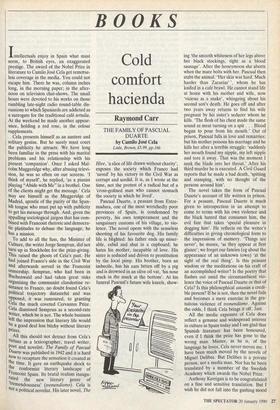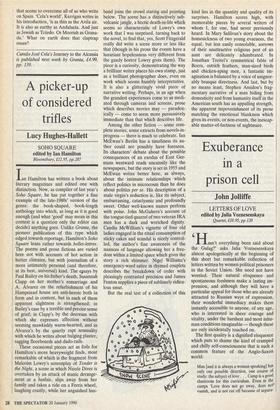BOOKS
Cold comfort hacienda
Raymond Carr
THE FAMILY OF PASCUAL DUARTE by Camilo Jose Cela Intellectuals enjoy in Spain what must seem, to British eyes, an exaggerated prestige. The award of the Nobel Prize in literature to Camilo Josd Cela got remone- less coverage in the media. You could not escape him. There he was, column inches long, in the morning paper; in the after- noon on television chat-shows. The small hours were devoted to his works on those rambling late-night radio round-table dis- cussions to which Spaniards are addicted as a surrogate for the traditional café tertulia. At the weekend he made another appear- ance, holding a red rose, in the colour supplements.
Cela presents himself as an austere and solitary genius. But he surely must court the publicity he attracts. We have long been familiar in the press with his marital Problems and his relationship with his Present 'companion'. Once I asked Mal- colm Muggeridge why, after abusing televi- sion, he was so often on our screens. 'I think of myself', he replied, 'as a pianist Playing "Abide with Me" in a brothel. One of the clients might get the message.' Cela may see himself as the Muggeridge of Madrid, apostle of the purity of the Span- ish tongue who must put up with publicity to get his message through. And, given the appalling sociological jargon that has com- bined with Francoist rhetoric and democra- tic platitudes to debase the language, he has a mission.
To add to all the fuss, the Minister of Culture, the writer Jorge Semprun, did not turn up in Stockholm for the prize-giving. This raised the ghosts of Cela's past. He had joined Franco's side in the Civil War and afterwards served in the Francoist censorship. Semprun, who had been in Buchenwald and had taken great risks organising the communist clandestine re- sistance to Franco, no doubt found Cela's Political trajectory distasteful and was °PPosed, it was rumoured, to granting Cela the much coveted Cervantes Prize. Cela dismissed Semprun as a second-rate Writer, which he is not. The whole business left the impression that literary life would be a good deal less bitchy without literary Prizes.
All this should not detract from Cela's virtues as a lexicographer, travel writer, Poet and novelist. The Family of Pascual !Duarte was published in 1942 and it is hard now to recapture the sensation it created at the time. It gave an earthquake shock to the conformist literary landscape of Francoist Spain. Its brutal realism inaugu- rated the new literary genre of `tremendousness' (tremendismo). Cela is not a political novelist. His later novel, The
Little, Brown, £5.99, pp.166
Hive, 'a slice of life drawn without charity', exposes the society which Franco had 'saved' by his victory in the Civil War as corrupt and sordid. It is, as I wrote at the time, not the protest of a radical but of a 'cross-grained man who cannot stomach the society in which he lived'.
Pascual Duarte, a peasant from Extre- madura, one of the most wretchedly poor provinces of Spain, is condemned by poverty, his own temperament and the sanguinary customs of his village, to vio- lence. The novel opens with the senseless shooting of his favourite dog. His family life is blighted: his father ends up miser- able, rabid and shut in a cupboard; he hates his mother, incapable of love. His sister is seduced and driven to prostitution by the local pimp. His brother, born an imbecile, has his ears bitten off by a pig and is drowned in an olive oil vat, 'his nose stuck in the muck at the bottom'. At his funeral Pascual's future wife kneels, show- ing 'the smooth whiteness of her legs above her black stockings, tight as a blood sausage'. After the honeymoon she aborts when the mare bolts with her. Pascual then stabs the animal. 'Her skin was hard. Much harder than Zacarias", whom he has knifed in a café brawl. He cannot stand life at home with his mother and wife, now 'vicious as a snake', whingeing about his second son's death. He goes off and after two years away returns to find his wife pregnant by his sister's seducer whom he kills. 'The flesh of his chest made the same sound as meat turning on a spit . . Blood began to pour from his mouth.' Out of prison, Pascual falls in love and remarries; but his mother poisons his marriage and he kills her after a terrible struggle: 'suddenly her mouth found my nipple, my left nipple and tore it away. That was the moment I sunk the blade into her throat.' After his third murder he is executed. A Civil Guard reports that he made a bad death, 'spitting and stamping, with no thought of the persons around him'.
The novel takes the form of Pascual Duarte's account of life written in prison. For a peasant, Pascual Duarte is much given to introspection in an attempt to come to terms with his own violence and the black hatred that consumes him, the evil fate that takes 'special pleasure in dogging him'. He reflects on the writer's difficulties in giving chronological form to the impressions of memory. 'Things are never', he muses, 'as they appear at first glance'; we forget our fancies (eg about the appearance of an unknown town) 'at the sight of the real thing'. Is this peasant wisdom or the meditations on his craft of an accomplished writer? Is the poetry that flashes out amid the circumambient vio- lence the voice of Pascual Duarte or that of Cela? Is this philosophical assassin a credi- ble person? If he is not, then the novel fails and becomes a mere exercise in the gra- tuitous violence of tremendismo. Against the odds, I think Cela brings it off. Just.
All the media exposure of Cela does reflect a genuine and widespread interest in culture in Spain today and I am glad that Spanish literature has been honoured, even if I think the prize has gone to the wrong man. Master, as he is, of the language he loves, Cela never moves me. I have been much moved by the novels of Miguel Delibes. But Delibes is a private person, not a media man. Nor has he been translated by a member of the Swedish Academy which awards the Nobel Prize.
Anthony Kerrigan is to be congratulated on a fine and sensitive translation. But I wish he did not fall into the gushing mood that seems to overcome all of us who write on Spain. `Cela's world', Kerrigan writes in his introduction, 'is as thin as the Avila air. It is also as earthy as Andalucia. And just as Jewish as Toledo. Or Moorish as Grana- da.' What on earth does that claptrap mean?
Camilo Jose Cela's Journey to the Alcassia is published next week by Granta, £4.99, pp. 139.



















































 Previous page
Previous page